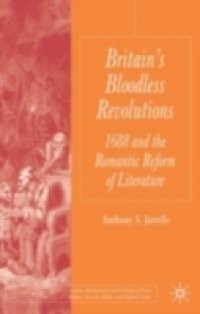In 1688 an institutional change subordinated the monarchy to the parliament, in part to avert the violence of the recent past. A century later a radical print culture threatened to take this process a step further and subordinate parliament to "the voice of the people". This did not happen. A shift from an expansive, Enlightenment-based print culture to a private, imaginative realm of literature redirected the powerful and effects of print and subordinated politics to culture. Romantic-period writers found in 1688 a model for containing the threat of popular violence that had come to be linked with freedom of the press and freedom of association. Not only did they write endlessly about bloodless Revolution, reinventing it in the process; they also wrote as bloodless Revolution, enacting this new form of politics and reinventing literature itself in the process. Against a more traditional reading of Romanticism, one that sees a revolutionary literature emerge from a failure to revolt, this book argues that literature did not manifest this failure but in fact helped to occasion it.

